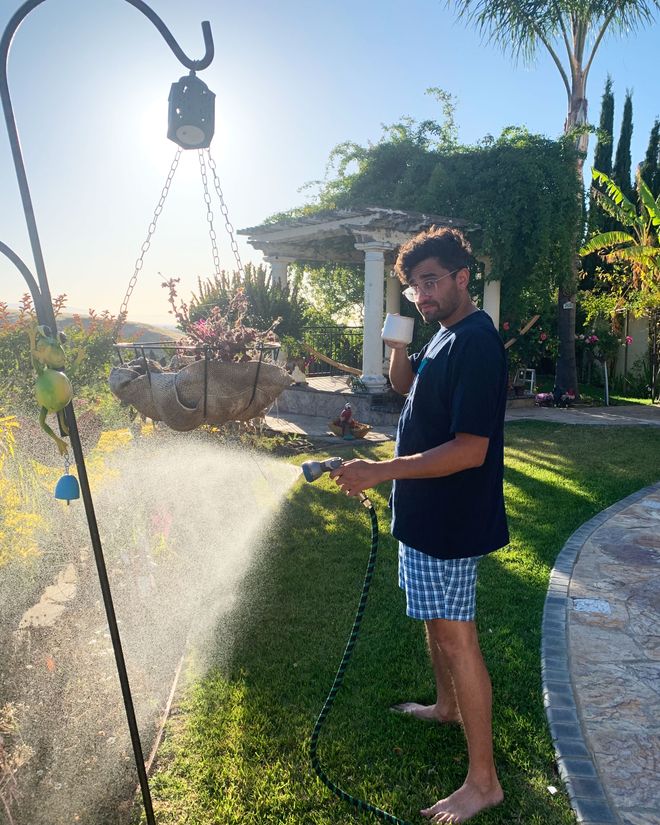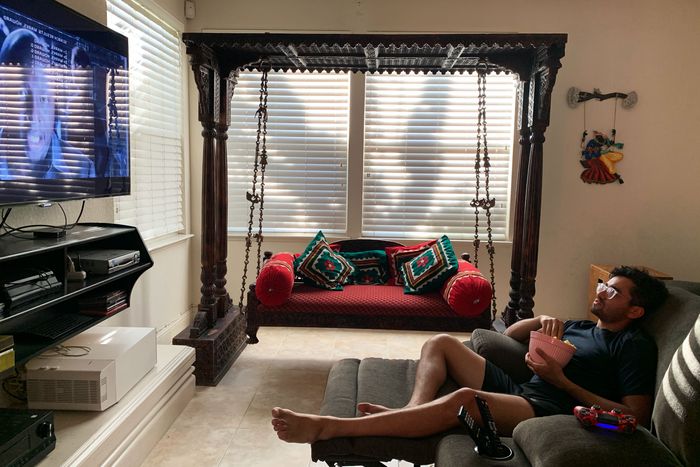
Aneesh Chaganty Is Living in His Parents’ House, Contemplating a Searching Sequel
by Aneesh Chaganty, Sean Fitz-GeraldThe View From Home
As coronavirus continues to spread, Vulture is speaking to filmmakers across the globe about how they are coping in a socially distanced world.
My parents are stuck in India. They’ve been there since February. It started off as a work trip, but lockdown in India keeps extending and so do their flights. So I decided to come up from L.A. [in mid-March] to take care of the house in San Jose that I grew up in. Weirdly enough, the more I get comfortable in the tasks of housekeeping, the more it feels like I’m becoming them: We have hundreds of plants that my parents have worked on for 20 years — their garden is their lifeblood — and now I’m the one spending an hour watering every few days. My parents are strict vegetarians. Now so am I. I make Indian filter coffee the same way my parents do. When my brother1 in New York City needs something from the house, he calls me, and I’m the one who ships it. I work out of my dad’s office. I even started wearing some of his clothes around the house, just as casualwear. All of this is amplified by the fact that, just like my dad or my mom don’t handle this house alone, I’m not doing it alone either. My girlfriend — who has never met my parents, because of this pandemic — is living in this house with me. Thankfully, she hasn’t raided my mom’s closet.
It’s an interesting time. My film Run2 was just about to come out [on May 8], and now suddenly it isn’t. You graduate film school to make movies that come out in theaters. You’ve accomplished the dream. To have that taken away is not a fun feeling. “Do I want Run out in theaters in a year? Or do I want the film out now, on digital?” That is the question I ask myself all the time. At the end of the day, I don’t make that decision, which is why I can feel free to speculate: I suspect the longer this goes on for every studio, [movies] ultimately become products. And if that studio needs to make money and they have something that can theoretically make money, it’ll come down to every studio being like, “When is the earliest, or the latest, that we need to start making money?” All I want for Run is for people to get to see it. Hopefully within the next year, but [the delay] gives us3 more time to work on the next thing.
I’ve always been a creature of habit. Even pre-pandemic. So I’ve tried to create [consistency at my parents’ house]. As far as mornings go, I’ll wake up, read the news, go work out — via internet videos — then I’ll take a shower, come back, and sit down in my dad’s chair, at my dad’s desk. Then I’ll tackle all my to-dos for work. Zoom after Zoom after Zoom after Zoom, writing emails, trying to be creative. Weirdly, my days here are busier than they were before [quarantine], which is a total place of privilege: I’m pitching a TV show, we’re overseeing a Searching sequel4, and I’m trying to write my next film, which I want to be the third [feature] I direct.
It’s an idea I came up with in 2013. But it was always bigger than I could execute with the resources I had. I never wanted to be a filmmaker who went from an $800,000 movie to a $30 million movie. I wanted to go more step-by-step. And I started realizing, as I was talking about this film more, that every movie has been a response to the previous one: As information-overload a film as Searching was, Run was a single through-line — two characters, one household, nothing complex. As positive and emotional as Searching was, I wanted Run to be, “Can we do a parent-kid story but have it be really twisted and dark? Can we leave an audience on a negative note?” So Run is a good step up from Searching, and I think this next project [the non-Searching-related movie] will be a good step up from Run. It’s an elevated heist film set in the world of immigration. We’re5 working on the outline right now, trying to figure out the mechanics of the heist.
The TV project we’re pitching is a show that has a lot of tech elements, like Searching. So it feels like a project that is, in some ways, uniquely capable of moving forward right now. Sev [Ohanian] and Nat [Qasabian] are going to produce. I’m going to direct the pilot and the finale, maybe a few episodes. But neither of us wrote it. It’s a mind-bending, tech-influenced thriller with elements of a courtroom drama based on a manuscript that hasn’t been released yet but that will be coming out as a book by Dan Frey, a really good novelist and screenwriter. We’re pitching it as a single season, with the potential to expand into two or three seasons, to production companies that are veterans in TV. And we’re going to partner with them and ideally take it to buyers — the Netflixes, the Amazons, the Hulus — and see if there’s interest.
For the last two or three weeks, I’ve been ensconcing myself in subgenres similar to the projects I’m working on, sitting in the same chair that my mom sits in to watch movies. I started with heists — Inside Man, Ocean’s Eleven, [1956’s] The Killing. The 1969 Italian Job is spectacular, and I had no idea it was that good. To study them, I would have a notebook and write down, “What are the tropes of this heist movie? What are the elements of this heist movie that it shares with that heist movie?”
Now I’m on a legal-thriller slash courtroom-drama kick. I rewatched A Few Good Men. That holds up. A Time to Kill was a surprisingly good Grisham adaptation. I thought Michael Clayton was incredible. I hated it when I was a kid — I obviously just didn’t understand it. It’s so thoughtful and quiet and sublime. I hadn’t cared about a lead character in a while as much as I did about Michael Clayton and the battle for his soul. I saw 12 Angry Men. That’s a masterpiece, no matter how you cut it. Three Kings was amazing. And as a brief trip outside [my work] subgenres, I saw Bad Education. It’s hard to say “best movie of the year,” because, like, only six movies have come out. But it’s my favorite thing I’ve seen all year.

I’ll try to watch, at the very least, one movie a day. I just feel really good when I am. I’m leaning forward. I’m studying why [the filmmakers] did that, why they cut there. But it’s hard to escape the feeling that, when I’m writing, I’m wondering, Am I writing a period piece? Is the world going to be so changed after [COVID-19] that everything we’re writing, subconsciously, is going to be so obviously set before the pandemic? There is that element to things. But also, in some ways, it’s made me more confident than ever that [this heist project] I’ve wanted to make for a while is the thing I want to make now. What I’m betting on is stuff that’s uplifting, stories that have a “the world is together–ness” to it. Maybe something that says, “We’re gonna be all right.” At least, that’s what I want to see. I watched Contagion in the beginning [of quarantine], and I was horrified the whole way through.
How many times have you thought you’ve had it? I remember how I was two months ago, like: “I touched that doorknob! I gotta wipe the doorknob! I gotta wash my hands!” Every day that goes by, that fear — for better or worse — ticks down a little bit. I was reading an article today about Hong Kong, and it’s like, We’re just going to learn to live with [the coronavirus], not against it. There’ll be a way that we can navigate safely, once we get to that point. But until we do, I’m a fan of the lockdown. I’m certainly not a fan of these [anti-lockdown] protests. And until my parents get on a flight back, I’ll be them. The [tasks] I’m doing that are theirs feel so second-nature — maybe because I’ve seen them do it my whole life, maybe because I just love it. As kids, we separate from our parents and become our own people, and then an opportunity like this reminds you we’re all just clones of each other. Replicating, replicating, replicating, replicating.
Annotations
Chaganty’s brother, Anoop, has a passion project called “Rap the News,” which he has been doing for the last year. Anoop was recently featured on Some Good News, John Krasinski’s quarantine webseries, as a rap correspondent.
In March, Lionsgate undated the theatrical release of Chaganty’s thriller Run — which stars Kiera Allen and Sarah Paulson — indefinitely because of coronavirus concerns.
Chaganty typically co-writes his feature projects with his creative partner, Sev Ohanian. Then Ohanian and Natalie Qasabian produce while Chaganty directs. The trio met through USC film school, and together they launched a production company, Search Party, last year.
Chaganty and his creative partner, Sev Ohanian, wrote the treatment for Searching 2. But they will not be writing the script, and Chaganty won’t direct. Instead, Chaganty, Ohanian, and Natalie Qasabian, will produce, and they said they will reveal whom they’ve chosen to write and direct the sequel at a later date.
Chaganty is co-writing the heist movie with Sev Ohanian. As with Search Party’s other feature projects, Ohanian and Natalie Qasabian plan to produce while Chaganty directs.